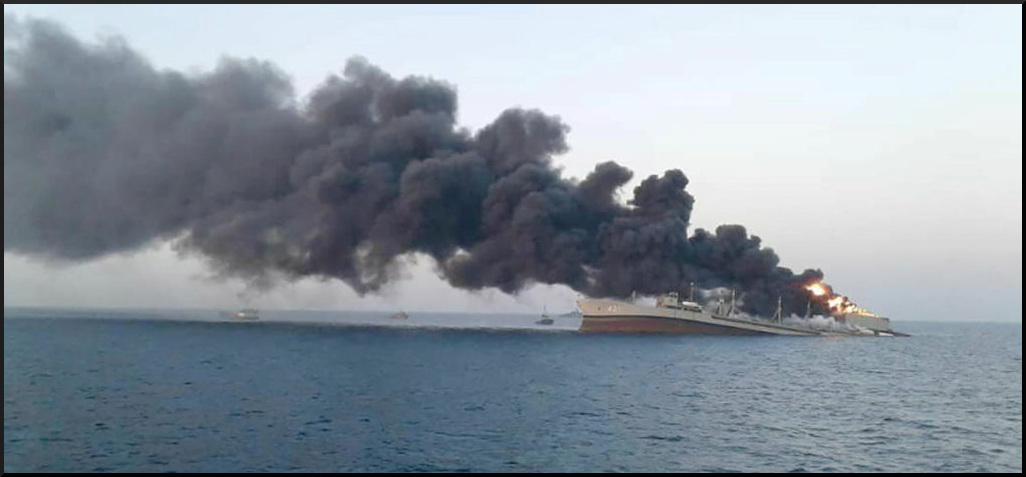by Lucas Leiroz, published on Info Brics, August, 2, 2021
New tensions rising between Iran and the West. Three days after an attack on an Israeli company’s oil tanker in the Gulf of Oman in the Arabian Sea, the governments of Israel, the UK and the US said they had evidence that the action was carried out by Tehran. The Iranian government vehemently denies all accusations, generating a clash of narratives.
In a recent statement, US Secretary of State Antony Blinken said the American government has enough evidence to point Iran as responsible for the tragedy that took place with the Mercer Street last Thursday. The attack took place about 200 km from the port city of Duqm, in Oman, apparently made by air vehicles. Two men, one British and one Romanian, died, and the ship was towed ashore some hours later. Despite having a Liberian flag, Mercer Street is controlled by an Israeli company based in London. Western experts believe that Iran would have carried out the operation in order to harm Israel.
According to claims by US officials, Tehran used military drones to launch explosives at the ship, following a tactical pattern that supposedly had been used previously by the Iranian armed forces in other operations in that region. Blinken emphasized that the attack violates the principle of freedom of navigation, affecting a very important trade route.
In the UK, immediately after Blinken’s speech, the British First Secretary of State and Foreign Secretary, Dominic Raab, endorsed the narrative and made harsh criticisms against Iran, promising a response to Tehran. These were his words:
“The UK condemns the unlawful and callous attack committed on a merchant vessel off the coast of Oman (…) We believe this attack was deliberate, targeted, and a clear violation of international law by Iran (…) Iran must end such attacks, and vessels must be allowed to navigate freely in accordance with international law”.
While Blinken’s words had a global impact, the first accusation against Iran was made by Israeli Prime Minister Naftali Bennett himself, who, since Thursday, has repeatedly claimed to have evidence corroborating the Iranian responsibility. This Sunday, Bennett reaffirmed his conviction in Iranian responsibility during a summit at the ministerial cabinet in Tel Aviv.
A curious point common to the US, the UK and Israel is that officials claim to have evidence but do not expose it. In the same sense, they do not even reveal the means used to reach the current conclusions, which makes their words sound like an unsubstantiated anti-Iran speech. This speech serves only as an argument to “justify” retaliations, perpetuating mutual aggression. Given that the Iranian government denies any involvement in the case, the Persian country’s presumption of innocence must be respected. The burden of proof on the accuser is a universal principle of justice. Until the proof is revealed, the only possible neutral conclusion is to suppose Iranian innocence – not because Tehran is right or wrong in this dispute, but because the West needs to prove its accusations.
In parallel, it is interesting how the accusers ignore that the coast of Oman is an extremely tense region with a high incidence of attacks against ships, from both sides. Particularly after the rise of American President Joe Biden, such incidents against Iranian vessels have increased significantly. An example of this situation is the case of early June, when the largest ship of the Iranian navy was sunk in the gulf, possibly hit by enemy naval mines.
Obviously, attacks do not justify new attacks, but it is necessary that the international society mobilizes to definitively end naval violence in the Middle East, instead of endorsing accusations and approving retaliatory measures. All sides involved must refrain from aggressive operations and the less interference from other continents’ powers (such as the US and the UK), the better for the balance between Iran and Israel.
In the short term, it is possible that violence will grow significantly in the Arabian Sea. The measures in response announced by the US, UK and Israel will certainly be focused on intimidating Iran through military incursions in the region. It is likely that Iranian vessels will be hit or simply surrounded in aggressive maneuvers and, thus, continuous retaliations will remain, creating a scenario of permanent security instability.
To change this scenario, it is necessary for both sides to abdicate the use of force, but it is even more necessary for international organizations to make efforts to monitor compliance with international law in the region, making it clear to the great military powers involved that their war capacity does not exempts them from obeying global norms.
Lucas Leiroz is a research fellow in international law at the Federal University of Rio de Janeiro.
